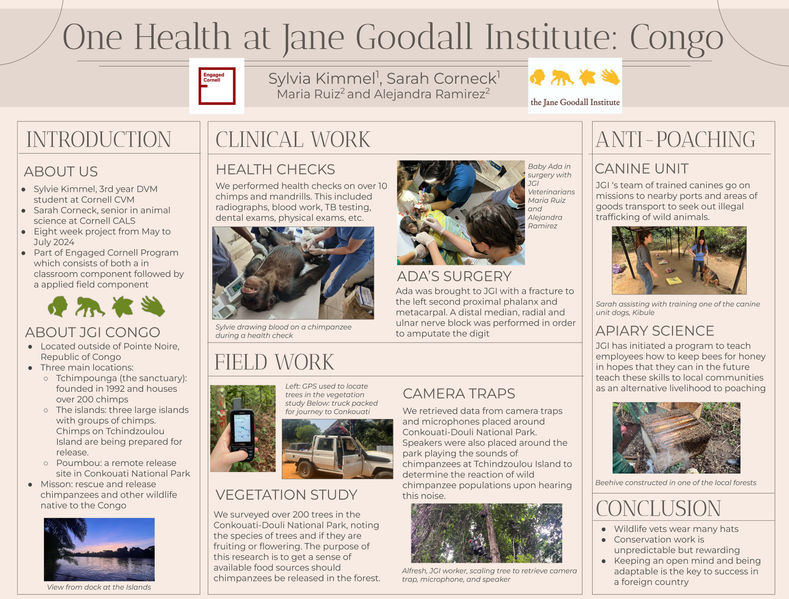
Republic of Congo
Chimpanzee Conservation with the Jane Goodall Institute
Chimpanzees (Pan troglodytes) are members of the Great Ape family and are our closest living relatives in the animal kingdom. They are native to equatorial Africa including the Republic of Congo. However, with fewer than 300,000 individuals left in the wild, they are in danger of becoming extinct due to poaching, the bushmeat industry, the illegal pet trade, habitat degradation and disease. An engaged learning experience at the Jane Goodall Institute’s Tchimpounga Chimpanzee Rehabilitation Center revealed the ins and outs of what it takes to help conserve the chimpanzees of the Congo, and efforts needed to save them.
Our Work
Cornell University students at JGI's Tchimpounga Sanctuary 2019
(video by Fernando Turmo)

Chimpanzee Health & Welfare
Our project also provided us with an invaluable opportunity to assist in routine health checks of the chimpanzees with Dr. Rebeca Atencia. These checks included daily microscopic examination of fecal samples to check for parasites, regular monitoring of temperature in several locations of the body as an indicator of disease, running over a dozen blood tests per chimpanzee to get an overall view of an individual’s health status, and providing birth control implants to reproductively active females.
Blood Tests
○ On-Field Test: Blood Glucose, Hematocrit, Hemoglobin, and Triglycerides
○ Routine Complete Blood Count & Biochemistry Panel ○ C-Reactive Protein (CRP)
○ Blood Typing
○ Serology: Hepatitis & Helicobacter pylori
○ Microscopic Evaluation: Filarial parasites
Chimpanzee Body Condition and Triage
The longevity of a wild chimpanzee community relies on its inherent social harmony, as well as the ability of its members to obtain adequate nutrition. Prior to release, the creation of a sound community can be achieved through strategic integration practices with the anticipation that these bonds will be upheld in the wild.
After release, non-invasive monitoring of chimpanzee well-being can be achieved through systematic observation within a well-defined scaffold. The Jane Goodall Institute is committed to caregiver involvement in the development of an integration strategy and BCS monitoring as a means of incorporating the native Congolese population and safeguarding the sustainability of the proposed practices.
Though preliminary, the authors believe that the proposed strategies for social integration and nutritional monitoring can significantly contribute the success of the world’s first rehabilitated and released chimpanzee community, opening the door for the re-establishment of wild populations across Africa.


Project Impact
-
Highlighted the intricacies and potential negative effects that zoonotic diseases have on chimpanzee reintroduction and the ecological health of domestic animals and local communities.
-
Provided additional context through a multi-disciplinary approach on measures that should be taken to improve chimpanzee conservation.
-
Emphasized the role that chimpanzee conservation has in maintaining ecosystem services that are closely linked to the biodiversity and livelihoods of local communities.
-
Together with the local caretakers we took measures to learn and improve wildlife management, animal husbandry, and water quality of the region in relation to the health of chimpanzees and caretakers alike.













